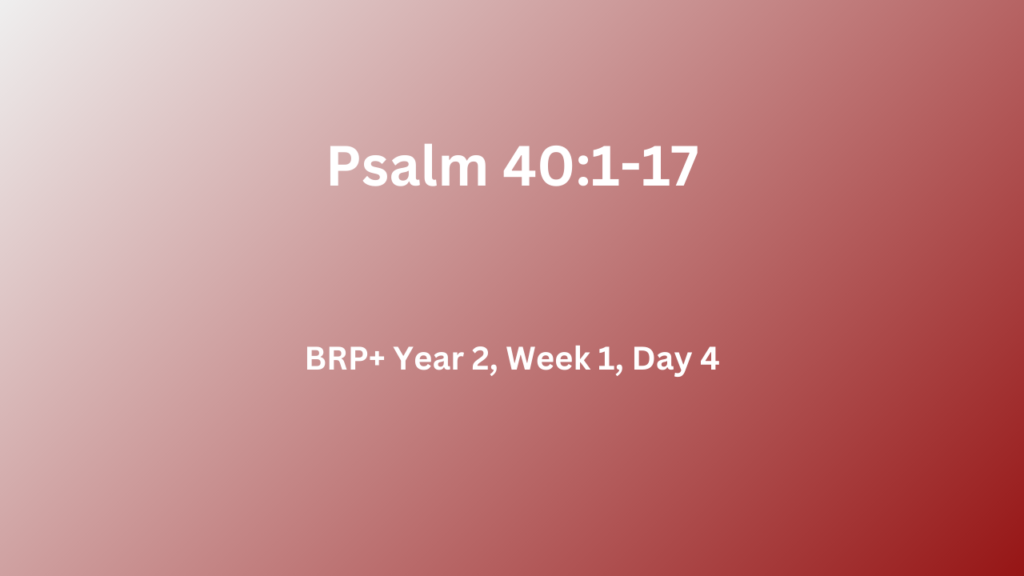Psalm 40:1-17
Q.1. How far had David fallen? Why was he full of praise for God? What impact would his deliverance have on others? What was it about David that moved God to act? – (Ps.40:1-5 & 12)
We don’t know for sure what trial David was speaking about. However, we do know that – He brought me up out of the pit of destruction, out of the miry clay, and He set my feet upon a rock making my footsteps firm … For evils beyond number have surrounded me; My iniquities have overtaken me, so that I am not able to see; They are more numerous than the hairs of my head, and my heart has failed me (Ps.40:2 & 12). He praised the Lord for answering him after some time, and for placing a song of praise on his lips (Ps.40:1-3). God’s deliverance of David would embolden others to trust in Him – … Many will see and fear and will trust in the Lord (Ps.40:3). God’s dealings with David underscored the principle that – How blessed is the man who has made the Lord his trust (Ps.40:4). The Lord doubtless intervened in David’s life because he would bring glory to Him, but also because of God’s regard for humanity – Many, O Lord my God, are the wonders which You have done, and Your thoughts toward us; There is none to compare with You. If I would declare and speak of them, they would be too numerous to count (Ps.40:5).
Q.2. Did God not require sacrifices from Israelites? What is it that the Lord looks for? What did David know about God’s scroll? Who alone perfectly keeps His Word? – (Ps.40:6-8 c.f. Heb.10:5-9)
Surely it was God Who set up the sacrificial system to cover for sin. Therefore, what did David mean when he wrote – Sacrifice and meal offering You have not desired; … Burnt offering and sin offering You have not required (Ps.40:6)? He was affirming Samuel’s message to King Saul, that sacrifice without obedience to God, is ill-founded (Ps.40:7-8 c.f. 1 Sam.15:18-22). He referred here to – the Scroll of the Book (Ps.40:7). All the kings of Israel were very familiar with these, since they had to personally write them out, read them, and live by them throughout their days (c.f. Deut.17:18-20). Once again, the Holy Spirit caused David to write a prophecy that was completely fulfilled by Jesus as the Saviour of the world – I delight to do Your will, O my God; Your Law is within my heart (Ps.40:8 c.f. Heb.10:5-9).
Q.3. In what way had David honoured God? How could he praise God in the midst of his trials? What was his expectation and hope? How did David’s trials prefigure those of Jesus? – (Ps.40:9-17)
More than any king, David gave expression of his passion for God, right before his people – 9 I have proclaimed glad tidings of righteousness in the great congregation … 10 … I have spoken of Your faithfulness and Your salvation; I have not concealed Your lovingkindness and Your truth from the great congregation (Ps.40:9-10). This song is fascinating because it proclaimed the Lord’s deliverance, yet described David still being beset by numerous trials – For evils beyond number have surrounded me; My iniquities have overtaken me, so that I am not able to see; They are more numerous than the hairs of my head, and my heart has failed me (Ps.40:12). This confession suggested that the trials had come upon him because of his sins, and this had caused his enemies to gloat over his demise (Ps.40:14). However, David had found forgiveness with God, although the healing of his reputation would take much longer. He cried to God – 13 Be pleased, O Lord, to deliver me; Make haste, O Lord, to help me. 14 Let those be ashamed and humiliated together who seek my life to destroy it; Let those be turned back and dishonoured who delight in my hurt (Ps.40:13-14). God’s forgiveness is one thing, but the unkindness and slander of others is another. He added – 16 Let all who seek You rejoice and be glad in You; Let those who love Your salvation say continually, “The Lord be magnified!” 17 Since I am afflicted and needy, let the Lord be mindful of me. You are my help and my deliverer; Do not delay, O my God (Ps.40:16-17). It is strange but true, that it is easier to be reconciled to a holy God, than to sinful people. All these insights into the slander by sinners highlight how sinners treat others, and especially how they treated Jesus at the time of His crucifixion.

